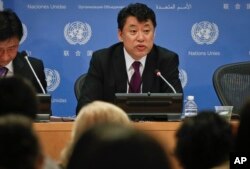U.S. Secretary of Defense Jim Mattis said North Koreans probably learned a lot from their latest rocket launch, adding that attempts to resolve the North Korea missile crisis through military force would be “tragic.”
Speaking to reporters at the Pentagon on Friday, Mattis declined to say whether the missile North Korea launched earlier this week had a controlled re-entry into the atmosphere.
Pyongyang claimed on Monday that the missile reached an altitude of about 2,000 kilometers (1,200 miles) and was capable of carrying “a large, heavy nuclear warhead.”
Gaining the ability to control a missile's re-entry into Earth's atmosphere from space would be a big step forward for the North Korean missile program.
North Korea has made no secret of its desire to develop missiles capable of targeting some of its neighbors and intercontinental ballistic missiles capable of delivering a nuclear warhead to the U.S. mainland.
“If this goes to a military solution, it is going to be tragic on an unbelievable scale, and so our effort is to work with the U.N., work with China, work with Japan, work with South Korea to try to find a way out of this situation,” Mattis said, adding that Chinese influence on the North Korean government “appears” to be having “some impact.”
South Korea's capital, Seoul, is home to about 10 million people and is located just 55 kilometers from the North Korean border.
Tensions on peninsula
Meanwhile, at the United Nations, North Korea's Deputy U.N. Ambassador Kim In Ryong again blamed the United States for the current tension on the Korean Peninsula.
“The current situation on the Korean Peninsula is often engulfed in a touch-and-go state to the brink of war, whose root cause squarely lies on the U.S.,” Kim told reporters at a hastily called news conference. He also criticized recent ICBM tests conducted by the United States and annual joint U.S.-South Korean annual military exercises as “provocative war maneuvers.”
U.S. missile test a routine action
America's top general confirmed Friday that the U.S. did recently test ICBMs in accordance with international protocols, but said the test “had nothing to do with North Korea” and was a routine action to ensure a “safe, reliable deterrent” against nuclear attacks.
“It wasn't messaged in that direction. It wasn't pointed in that direction,” Chairman of the Joint Chiefs of Staff General Joseph Dunford said. “For North Korea to compare what they have been doing to threaten and intimidate their neighbors, as well as the United States, to our routine military exercises — advertised well in advance with full transparency — would be an unfair comparison.”





